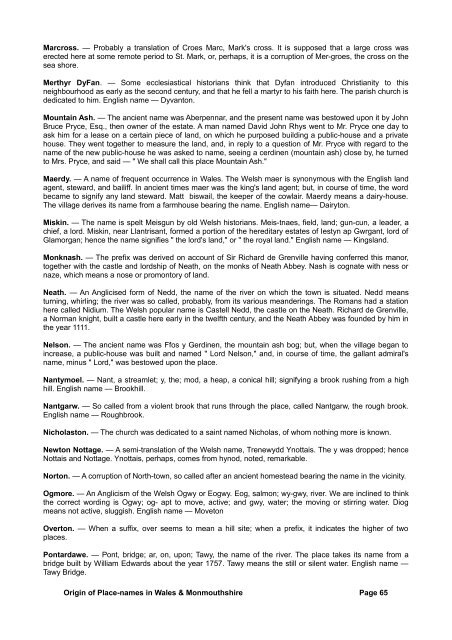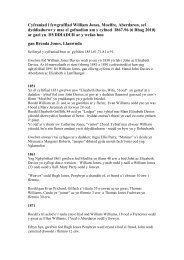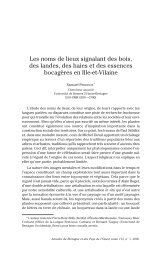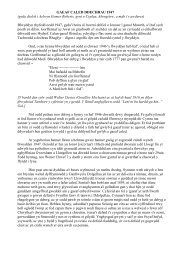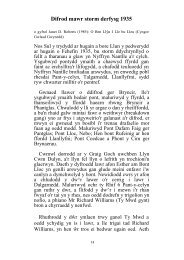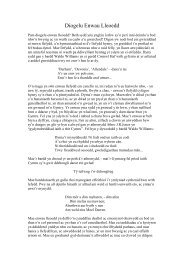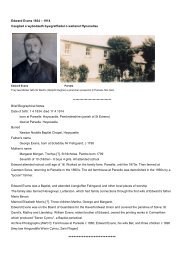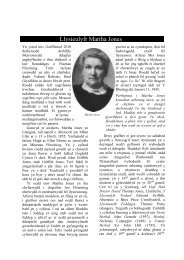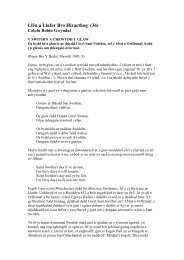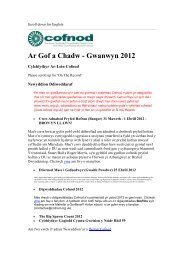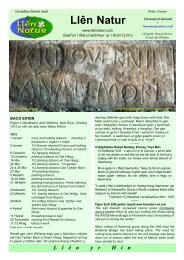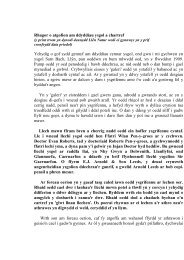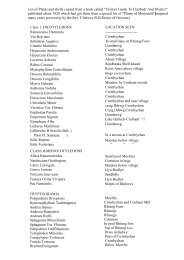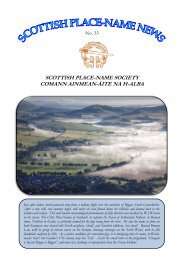Marcross. — Probably a translation <strong>of</strong> Croes Marc, Mark's cross. It is supposed that a large cross waserected here at some remote period to St. Mark, or, perhaps, it is a corruption <strong>of</strong> Mer-groes, <strong>the</strong> cross on <strong>the</strong>sea shore.Merthyr DyFan. — Some ecclesiastical historians th<strong>in</strong>k that Dyfan <strong>in</strong>troduced Christianity to thisneighbourhood as early as <strong>the</strong> second century, <strong>and</strong> that he fell a martyr to his faith here. The parish church isdedicated to him. English name — Dyvanton.Mounta<strong>in</strong> Ash. — The ancient name was Aberpennar, <strong>and</strong> <strong>the</strong> present name was bestowed upon it by JohnBruce Pryce, Esq., <strong>the</strong>n owner <strong>of</strong> <strong>the</strong> estate. A man named David John Rhys went to Mr. Pryce one day toask him for a lease on a certa<strong>in</strong> piece <strong>of</strong> l<strong>and</strong>, on which he purposed build<strong>in</strong>g a public-house <strong>and</strong> a privatehouse. They went toge<strong>the</strong>r to measure <strong>the</strong> l<strong>and</strong>, <strong>and</strong>, <strong>in</strong> reply to a question <strong>of</strong> Mr. Pryce with regard to <strong>the</strong>name <strong>of</strong> <strong>the</strong> new public-house he was asked to name, see<strong>in</strong>g a cerd<strong>in</strong>en (mounta<strong>in</strong> ash) close by, he turnedto Mrs. Pryce, <strong>and</strong> said — " We shall call this <strong>place</strong> Mounta<strong>in</strong> Ash."Maerdy. — A name <strong>of</strong> frequent occurrence <strong>in</strong> Wales. The Welsh maer is synonymous with <strong>the</strong> English l<strong>and</strong>agent, steward, <strong>and</strong> bailiff. In ancient times maer was <strong>the</strong> k<strong>in</strong>g's l<strong>and</strong> agent; but, <strong>in</strong> course <strong>of</strong> time, <strong>the</strong> wordbecame to signify any l<strong>and</strong> steward. Matt biswail, <strong>the</strong> keeper <strong>of</strong> <strong>the</strong> cowlair. Maerdy means a dairy-house.The village derives its name from a farmhouse bear<strong>in</strong>g <strong>the</strong> name. English name— Dairyton.Misk<strong>in</strong>. — The name is spelt Meisgun by old Welsh historians. Meis-tnaes, field, l<strong>and</strong>; gun-cun, a leader, achief, a lord. Misk<strong>in</strong>, near Llantrisant, formed a portion <strong>of</strong> <strong>the</strong> hereditary estates <strong>of</strong> Iestyn ap Gwrgant, lord <strong>of</strong>Glamorgan; hence <strong>the</strong> name signifies " <strong>the</strong> lord's l<strong>and</strong>," or " <strong>the</strong> royal l<strong>and</strong>." English name — K<strong>in</strong>gsl<strong>and</strong>.Monknash. — The prefix was derived on account <strong>of</strong> Sir Richard de Grenville hav<strong>in</strong>g conferred this manor,toge<strong>the</strong>r with <strong>the</strong> castle <strong>and</strong> lordship <strong>of</strong> Neath, on <strong>the</strong> monks <strong>of</strong> Neath Abbey. Nash is cognate with ness ornaze, which means a nose or promontory <strong>of</strong> l<strong>and</strong>.Neath. — An Anglicised form <strong>of</strong> Nedd, <strong>the</strong> name <strong>of</strong> <strong>the</strong> river on which <strong>the</strong> town is situated. Nedd meansturn<strong>in</strong>g, whirl<strong>in</strong>g; <strong>the</strong> river was so called, probably, from its various me<strong>and</strong>er<strong>in</strong>gs. The Romans had a stationhere called Nidium. The Welsh popular name is Castell Nedd, <strong>the</strong> castle on <strong>the</strong> Neath. Richard de Grenville,a Norman knight, built a castle here early <strong>in</strong> <strong>the</strong> twelfth century, <strong>and</strong> <strong>the</strong> Neath Abbey was founded by him <strong>in</strong><strong>the</strong> year 1111.Nelson. — The ancient name was Ffos y Gerd<strong>in</strong>en, <strong>the</strong> mounta<strong>in</strong> ash bog; but, when <strong>the</strong> village began to<strong>in</strong>crease, a public-house was built <strong>and</strong> named " Lord Nelson," <strong>and</strong>, <strong>in</strong> course <strong>of</strong> time, <strong>the</strong> gallant admiral'sname, m<strong>in</strong>us " Lord," was bestowed upon <strong>the</strong> <strong>place</strong>.Nantymoel. — Nant, a streamlet; y, <strong>the</strong>; mod, a heap, a conical hill; signify<strong>in</strong>g a brook rush<strong>in</strong>g from a highhill. English name — Brookhill.Nantgarw. — So called from a violent brook that runs through <strong>the</strong> <strong>place</strong>, called Nantgarw, <strong>the</strong> rough brook.English name — Roughbrook.Nicholaston. — The church was dedicated to a sa<strong>in</strong>t named Nicholas, <strong>of</strong> whom noth<strong>in</strong>g more is known.Newton Nottage. — A semi-translation <strong>of</strong> <strong>the</strong> Welsh name, Trenewydd Ynottais. The y was dropped; henceNottais <strong>and</strong> Nottage. Ynottais, perhaps, comes from hynod, noted, remarkable.Norton. — A corruption <strong>of</strong> North-town, so called after an ancient homestead bear<strong>in</strong>g <strong>the</strong> name <strong>in</strong> <strong>the</strong> vic<strong>in</strong>ity.Ogmore. — An Anglicism <strong>of</strong> <strong>the</strong> Welsh Ogwy or Eogwy. Eog, salmon; wy-gwy, river. We are <strong>in</strong>cl<strong>in</strong>ed to th<strong>in</strong>k<strong>the</strong> correct word<strong>in</strong>g is Ogwy; og- apt to move, active; <strong>and</strong> gwy, water; <strong>the</strong> mov<strong>in</strong>g or stirr<strong>in</strong>g water. Diogmeans not active, sluggish. English name — MovetonOverton. — When a suffix, over seems to mean a hill site; when a prefix, it <strong>in</strong>dicates <strong>the</strong> higher <strong>of</strong> two<strong>place</strong>s.Pontardawe. — Pont, bridge; ar, on, upon; Tawy, <strong>the</strong> name <strong>of</strong> <strong>the</strong> river. The <strong>place</strong> takes its name from abridge built by William Edwards about <strong>the</strong> year 1757. Tawy means <strong>the</strong> still or silent water. English name —Tawy Bridge.Orig<strong>in</strong> <strong>of</strong> Place-<strong>names</strong> <strong>in</strong> Wales & Monmouthshire Page 65
Penrhiwfer.- Pen, head, top; rhiw, slope, mounta<strong>in</strong>-side; fir, fem<strong>in</strong><strong>in</strong>e form <strong>of</strong> <strong>the</strong> adjective byr, short, abrupt.English name — Uphill.P<strong>and</strong>y. — Several gr<strong>in</strong>d<strong>in</strong>g mills were <strong>in</strong> <strong>the</strong> Rhondda Valley called Cwmsatrbren Mill, Tyle Coch Mill, &c,<strong>and</strong> P<strong>and</strong>y was <strong>the</strong> full<strong>in</strong>g mill. English name— Full<strong>in</strong>g Mill.Pentre. — A populous village near Treorchy, so called from a very ancient farmstead bear<strong>in</strong>g <strong>the</strong> name. Itwas decided, at a meet<strong>in</strong>g <strong>of</strong> <strong>the</strong> Rhondda Chamber <strong>of</strong> Trade, April 8th, 1886, to petition <strong>the</strong> Postmaster-General for a town post-<strong>of</strong>fice at Pentre, to be called Ystrad Rhondda.Pendoylan. — A corruption <strong>of</strong> Pendeulwyn, which means " <strong>the</strong> top <strong>of</strong> two groves." The physical aspect <strong>of</strong> <strong>the</strong>district probably suggested <strong>the</strong> name. English name — Grovesend.Pantdu. — Pant, a hollow; du, black, so called from an old farmstead bear<strong>in</strong>g <strong>the</strong> name, <strong>and</strong> it answers to<strong>the</strong> physical position <strong>of</strong> <strong>the</strong> village, be<strong>in</strong>g* situated <strong>in</strong> a dreary d<strong>in</strong>gle between Cwmavon <strong>and</strong> Aberavon.English name — Darkcomb.Pwllygwlaw. — This village takes its name from a farmhouse so called. Pwll, pool; gwlaw, ra<strong>in</strong>. Englishname — Ra<strong>in</strong>pool.Pantcadifor. — So called, accord<strong>in</strong>g to some, <strong>in</strong> honour <strong>of</strong> Cadivor, son <strong>of</strong> Cedrych, who is supposed tohave lived here some time. O<strong>the</strong>rs th<strong>in</strong>k Cadifor is a corruption <strong>of</strong> cawd Ifor, signify<strong>in</strong>g <strong>the</strong> <strong>place</strong> Back wasfound dead after a terrible conflict with his enemies. A few refer <strong>the</strong> name to Coed Ifor, Ivor's wood. Englishname- Ivor this-<strong>place</strong>, or Ivorton.Pantscallog. — The village takes its name from a farmhouse <strong>of</strong> <strong>the</strong> same appellation. Sgallog is anabbreviation <strong>of</strong> y sgallog, abound<strong>in</strong>g with thistles. English name — Thistleham.Penmarc. — The name signifies <strong>the</strong> head <strong>of</strong> St. Mark. We had occasion before to refer to Mark's cross, bu<strong>the</strong>re we are quite at sea as to <strong>the</strong> <strong>orig<strong>in</strong></strong> <strong>of</strong> Mark's head. English name — Markshead.Penrice. — An Anglicism <strong>of</strong> <strong>the</strong> Welsh Pen Rhys y Rhys' s head. Rhys, <strong>the</strong> son <strong>of</strong> Caradog ab Iestyn, wasbeheaded here by <strong>the</strong> Normans <strong>in</strong> 1099, from which circumstance <strong>the</strong> <strong>place</strong> took its name. English name —Reeshead.Penyfai. — Fai is a mutation <strong>of</strong> mat, a. pla<strong>in</strong>; <strong>the</strong>refore, <strong>the</strong> name signifies <strong>the</strong> head <strong>of</strong> <strong>the</strong> pla<strong>in</strong> * Englishname — Pla<strong>in</strong>ham.Pentrebach. — The name signifies a small village. It is situate about a mile below Merthyr Tydfil, <strong>and</strong> socalled, evidently, to dist<strong>in</strong>guish it from <strong>the</strong> latter, which is called colloquially Y Pentref, <strong>the</strong> village* Englishname — Smallham.Port Eynon. — Probably from E<strong>in</strong>ion, a descendant <strong>of</strong> Howell <strong>the</strong> Good. See Cors E<strong>in</strong>ion.Pentyrch. — The affix has elicited many conjectures. An old tradition has it that a parish wake was wont tobe held <strong>in</strong> <strong>the</strong> vic<strong>in</strong>ity <strong>in</strong> olden times, dur<strong>in</strong>g which very questionable pastimes were carried on. A few daysprevious to <strong>the</strong> festival a piece <strong>of</strong> wood was fixed <strong>in</strong> <strong>the</strong> ground. Every young woman that <strong>in</strong>tended be<strong>in</strong>gpresent <strong>in</strong> <strong>the</strong> wake was expected to make a torch (torque or wreath), with her name on it, <strong>and</strong> <strong>the</strong> colourshe purposed wear<strong>in</strong>g on that day plaited <strong>the</strong>re<strong>in</strong>. This wreath was an ornament worn by our forefa<strong>the</strong>rsround <strong>the</strong> neck, formed <strong>of</strong> small r<strong>in</strong>gs <strong>of</strong> metals <strong>in</strong>terlaced <strong>in</strong> each o<strong>the</strong>r. One young woman produced abetter torque than all her rivals, <strong>and</strong> <strong>the</strong> byst<strong>and</strong>ers unanimously exclaimed, " Wei, dyma ben y tyrch," i.e., "Well, this is <strong>the</strong> head <strong>of</strong> <strong>the</strong> torques," <strong>and</strong> so runs <strong>the</strong> traditional <strong>orig<strong>in</strong></strong> <strong>of</strong> this <strong>place</strong>-name. " Mi dyna'r dorch achwi" ("I'll pluck <strong>the</strong> torques with you ") is a very common Welsh expression. Some th<strong>in</strong>k <strong>the</strong> name is acorruption <strong>of</strong> Pen-yr-ych, <strong>the</strong> head <strong>of</strong> <strong>the</strong> ox. There is a combe hard by called Cwm-y-fuwch, <strong>the</strong> vale <strong>of</strong> <strong>the</strong>cow, <strong>the</strong> extreme end <strong>of</strong> which bears strik<strong>in</strong>g resemblance to <strong>the</strong> form <strong>of</strong> an ox's head. The right word<strong>in</strong>g isPen Twrch, boar's head, from <strong>the</strong> similarity <strong>of</strong> <strong>the</strong> brow <strong>of</strong> <strong>the</strong> Garth mounta<strong>in</strong>, at <strong>the</strong> base <strong>of</strong> which <strong>the</strong>village quietly rests, to a boar's head. A mounta<strong>in</strong> <strong>in</strong> Wales is called Moel-ben twrch, boar's head hill,obviously for <strong>the</strong> same reason. English name — Boar's Head.Orig<strong>in</strong> <strong>of</strong> Place-<strong>names</strong> <strong>in</strong> Wales & Monmouthshire Page 66
- Page 1 and 2:
HANDBOOK OF THE ORIGIN OF PLACE-NAM
- Page 3 and 4:
§ § § § §The Author begs to st
- Page 5 and 6:
pitiful cries of the railway offici
- Page 7 and 8:
Bishop Percy says that "in England,
- Page 9 and 10:
The city of Chester is still popula
- Page 11 and 12:
There's Cumwhitton, Cumwhinton, Cum
- Page 13 and 14:
Llwyn in its primary' sense means a
- Page 15 and 16:
PLACE-NAMES IN WALES.Wales. — The
- Page 17 and 18: Church are generally dedicated to e
- Page 19 and 20: think he was a contemporary of St.
- Page 21 and 22: Rhosbeirio. — Rhos, a moor, a dry
- Page 23 and 24: of Brecknock," states that this vic
- Page 25 and 26: Cam cnwir ef Cwmdu,Cwm gwyn yw & n
- Page 27 and 28: Penderyn. — A corruption probably
- Page 29 and 30: Ardudwy. — Ar, upon or above; tud
- Page 31 and 32: to mark its pre-eminence over the o
- Page 33 and 34: Some think that eirw is a corruptio
- Page 35 and 36: present form — Caerfyrddin.Abergw
- Page 37 and 38: place of refuge; hence the name. En
- Page 39 and 40: Llansawyl. — The church was dedic
- Page 41 and 42: eject. The village took its name fr
- Page 43 and 44: house, and attempted to kill an inf
- Page 45 and 46: Gwydir. — Prima facie one may tak
- Page 47 and 48: Nefyn. — The church was probably
- Page 49 and 50: DENBIGHSHIRE.Anglicized form of Din
- Page 51 and 52: Llangollen. — From Collen, a sain
- Page 53 and 54: hands into their pockets to pay a c
- Page 55 and 56: Cefn. — The name signifies a ridg
- Page 57 and 58: Maesgarmon. — Named in honour of
- Page 59 and 60: Abertridwr. — Tridwr, three water
- Page 61 and 62: it is said, was originally built by
- Page 63 and 64: Cwmllynfell. — Cwm, a narrow vale
- Page 65 and 66: Gwarycaeau. — Gwdr, the nape of t
- Page 67: means a cultivated region, a vale,
- Page 71 and 72: Port Talbot. — So called in 1835
- Page 73 and 74: Trealaw. — This appellation was g
- Page 75 and 76: Aberdyfi. — So called from its si
- Page 77 and 78: Llanddwywe. — From Dwywau, a desc
- Page 79 and 80: Crickhowell and some in the directi
- Page 81 and 82: Griffithstown. — This village was
- Page 83 and 84: and gwy, water. Treiddiod troth tna
- Page 85 and 86: derive Tintern from din, fortified
- Page 87 and 88: Caersws. — It appears that the Ro
- Page 89 and 90: English name — Ervylton.Llanymech
- Page 91 and 92: Angle. — Probably from the angle-
- Page 93 and 94: Gellyswick. — Another hybrid. Gel
- Page 95 and 96: that the two rivers in their flowin
- Page 97 and 98: ecame the bishop of the see, and wa
- Page 99 and 100: earth formerly stood on a summit on
- Page 101 and 102: Pilleth. — A corruption of pwll,
- Page 103 and 104: Howells, Rev. J., Mountain AshHowel
- Page 105 and 106: Williams, D., PenywernWilliams, Rev


